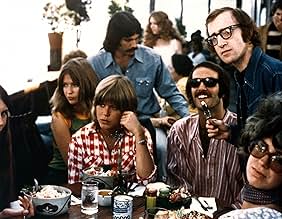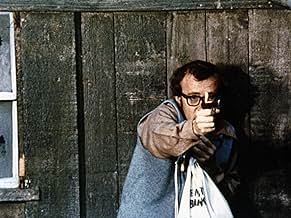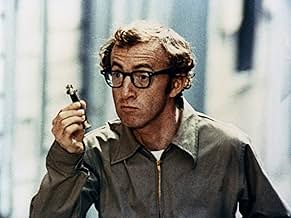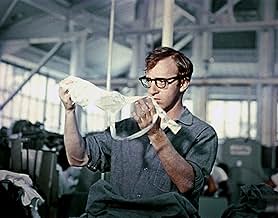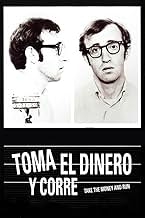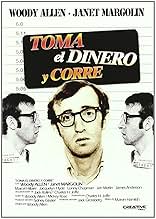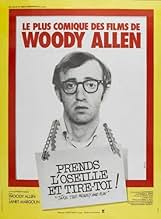AVALIAÇÃO DA IMDb
7,2/10
32 mil
SUA AVALIAÇÃO
A vida e a época do inepto ladrão de bancos Virgil Starkwell.A vida e a época do inepto ladrão de bancos Virgil Starkwell.A vida e a época do inepto ladrão de bancos Virgil Starkwell.
- Prêmios
- 3 indicações no total
Dan Frazer
- Julius Epstein - The Psychiatrist
- (as Don Frazier)
Jackson Beck
- The Narrator
- (narração)
- Direção
- Roteiristas
- Elenco e equipe completos
- Produção, bilheteria e muito mais no IMDbPro
Avaliações em destaque
"Take the Money and Run" is an absolutely hilarious Woody Allen film, done in a quasi-documentary style, about a career criminal, Virgil Starkwell, who has a very unsuccessful career. His prison breaks don't go as planned, his robberies are a disaster and usually coincide with someone else's robbery of the same place, and his planning of a job would be fine if only he weren't talking to an associate in a restaurant while the police are in the booth behind him. One nice perk of failure: while attempting to rob a young woman's purse, he falls in love with her (Janet Margolin). Virgil does admit at one point thinking of foregoing robbery and taking up a career in singing. He doesn't mention the cello, which gave him his start in music - and crime.
This is one of those laugh out loud even when you're alone movies of which there are all too few. But this is one. Over a tough, FBI-type narration, we watch Virgil's futile attempts at making money through crime, see his parents (disguised) interviewed, as well as his wife and the various police and investigators he meets along the way.
It's amazing to look at this film and then look at "Match Point" done 35 years later and see the evolution of this brilliant man. Woody Allen is capable of rock-solid comedy as well as provocative movie-making. Although he's had a few blips along the way, one wonders what he'll think of next.
This is one of those laugh out loud even when you're alone movies of which there are all too few. But this is one. Over a tough, FBI-type narration, we watch Virgil's futile attempts at making money through crime, see his parents (disguised) interviewed, as well as his wife and the various police and investigators he meets along the way.
It's amazing to look at this film and then look at "Match Point" done 35 years later and see the evolution of this brilliant man. Woody Allen is capable of rock-solid comedy as well as provocative movie-making. Although he's had a few blips along the way, one wonders what he'll think of next.
Woody Allen hit gold with his second film, "Take the Money and Run", which is a basic film that works on so many levels and is memorable strictly for its charm and good wit.
The story follows Allen's Virgil Starkwell, whose life is told in documentary fashion. We learn he had a strange childhood and turned to crime to fulfill his needs. We learn of his romance and sympathize with him as we engage in prison escapes and witness him put in a chain gang. The documentary style might prove to be a "gimmick" of sorts, but it works because had the story been told any other way it simply would not have worked.
Also, "Take the Money" is an early token of what's to come and what the general audience will expect of Allen; smooth drama balanced by fast, witty monologues and lots of self-humiliation. To see this is to witness the early work of the director who ultimately brought us "Bananas", "Sleeper", "Manhattan", and the Oscar-winning "Annie Hall". And if anything, just track it for its over-the-top humor, not as in-your-face funny as "Sleeper" or as sexually hilarious as "Annie Hall", but it's warm and withdrawn, balanced all together by a very good ending (always one of the weaker parts in almost all of Allen's films).
Highly recommended! ***+ (8.5/10)
The story follows Allen's Virgil Starkwell, whose life is told in documentary fashion. We learn he had a strange childhood and turned to crime to fulfill his needs. We learn of his romance and sympathize with him as we engage in prison escapes and witness him put in a chain gang. The documentary style might prove to be a "gimmick" of sorts, but it works because had the story been told any other way it simply would not have worked.
Also, "Take the Money" is an early token of what's to come and what the general audience will expect of Allen; smooth drama balanced by fast, witty monologues and lots of self-humiliation. To see this is to witness the early work of the director who ultimately brought us "Bananas", "Sleeper", "Manhattan", and the Oscar-winning "Annie Hall". And if anything, just track it for its over-the-top humor, not as in-your-face funny as "Sleeper" or as sexually hilarious as "Annie Hall", but it's warm and withdrawn, balanced all together by a very good ending (always one of the weaker parts in almost all of Allen's films).
Highly recommended! ***+ (8.5/10)
For those of you who think that all Woody Allen's movies are vapid stories of neurotic rich New Yorkers, you need to see his early movies. "Take the Money and Run" is a good example. Allen plays Virgil Starkwell, an inept criminal. No matter what sort of crime he tries to pull off, something always goes wrong. Probably the funniest scene is when he tries to escape from jail like John Dillinger did. Other scenes include the time when the authorities use him in an experiment, with a silly result.
Anyway, Woody Allen's old movies were really funny. The thing was that he created a bunch of outlandish premises and infused his New York Jewish humor. This is what comedy is all about!
Anyway, Woody Allen's old movies were really funny. The thing was that he created a bunch of outlandish premises and infused his New York Jewish humor. This is what comedy is all about!
Virgil Starkwell was a product of his environment. Born into a poor family living in a rough community, Virgil soon finds companionship with a rough crowd and gets sucked into a life of petty crime from a very young age. An interest in the cello is not enough to set him straight and his acts continue into adulthood. Love, a powerful motivator, proves to be his undoing as he tries to rob a bank to fund his relationship.
We all talk about Allen's "earlier, funnier" films (even he does) but this probably doesn't extend the whole way to the very start of his film career because this, his second film, isn't up to the standard of Love & Death, Annie Hall and the like. The film is a mockumentary looking at the life and career of failing small-time criminal Virgil Starkwell and as such there is a basic narrative to provide some structure. Supposedly tightened up significantly in the editing room, the film is still pretty baggy at times and doesn't really have the material to carry it to even 85 minutes. However what the film does do well is produce plenty of imaginative moments that made me laugh out of nothing. I think of the scene where Virgil hires a car to run his blackmailer down, the spelling errors on the notes and others that are imaginative twists on what you expect and funnier for it. The one liners (and dialogue generally) is not as strong as Allen fans would hope for because the humour tends towards the sight gag.
This isn't a criticism because the sight gags are mostly good but the problem is one of consistency. I wasn't laughing anywhere enough for this to be a memorable comedy and there were quite a few lulls. These came particularly where the film had a section of narrative or dialogue rather than fast visual snippets under the narrator it is the latter that are the strongest parts of the film but they can't come quick enough and there isn't enough to support it in-between. Allen makes a good lead of course and I found him to be very good at delivering the visual comedy. Margolin is a bit too stiff; not good enough at the comedy or the dramatic stuff. The rest of the support cast does what they are required to do but the film does belong to Allen and his script. Credit should go to editor Rosenblum for making it as tight as possible and keeping the visual gags flowing as best as he can while limiting the weaker dialogue bits.
Overall then an amusing film that will appeal mostly to Woody Allen films. There are plenty of imaginative comedy moments but it is not as consistent as it needed to be to consider it on the same level as Allen's finest films (that would follow this in the 1970's in my opinion).
We all talk about Allen's "earlier, funnier" films (even he does) but this probably doesn't extend the whole way to the very start of his film career because this, his second film, isn't up to the standard of Love & Death, Annie Hall and the like. The film is a mockumentary looking at the life and career of failing small-time criminal Virgil Starkwell and as such there is a basic narrative to provide some structure. Supposedly tightened up significantly in the editing room, the film is still pretty baggy at times and doesn't really have the material to carry it to even 85 minutes. However what the film does do well is produce plenty of imaginative moments that made me laugh out of nothing. I think of the scene where Virgil hires a car to run his blackmailer down, the spelling errors on the notes and others that are imaginative twists on what you expect and funnier for it. The one liners (and dialogue generally) is not as strong as Allen fans would hope for because the humour tends towards the sight gag.
This isn't a criticism because the sight gags are mostly good but the problem is one of consistency. I wasn't laughing anywhere enough for this to be a memorable comedy and there were quite a few lulls. These came particularly where the film had a section of narrative or dialogue rather than fast visual snippets under the narrator it is the latter that are the strongest parts of the film but they can't come quick enough and there isn't enough to support it in-between. Allen makes a good lead of course and I found him to be very good at delivering the visual comedy. Margolin is a bit too stiff; not good enough at the comedy or the dramatic stuff. The rest of the support cast does what they are required to do but the film does belong to Allen and his script. Credit should go to editor Rosenblum for making it as tight as possible and keeping the visual gags flowing as best as he can while limiting the weaker dialogue bits.
Overall then an amusing film that will appeal mostly to Woody Allen films. There are plenty of imaginative comedy moments but it is not as consistent as it needed to be to consider it on the same level as Allen's finest films (that would follow this in the 1970's in my opinion).
Take the Money and Run ranked rather high on the AFI's list of the 100 Funniest movies, which surprised me. Although it's got some hilarious bits of comedy (the bank robbery, of course, is the funniest bit), the humor seems a bit dated, on par with What's New Pussycat or Casino Royale as opposed to Bananas and Sleeper (his two early comedy classics, in my opinion). Janet Margolin (RIP) was a talented actress, but I didn't find her particularly funny in this movie. She was better in a brief role as one of Woody's high-strung ex-wives in Annie Hall. Louise Lasser and Diane Keaton were worthier (and funnier) replacements. A good bet for rainy day laughs, but not one of the funniest movies of all time.
Você sabia?
- CuriosidadesThe first widely-released "mockumentary".
- Erros de gravaçãoAs the chain gang escapes, they climb the same embankment twice.
- ConexõesFeatured in The Dick Cavett Show: Woody Allen (1971)
Principais escolhas
Faça login para avaliar e ver a lista de recomendações personalizadas
- How long is Take the Money and Run?Fornecido pela Alexa
Detalhes
- Data de lançamento
- País de origem
- Idiomas
- Também conhecido como
- Take the Money and Run
- Locações de filme
- Empresas de produção
- Consulte mais créditos da empresa na IMDbPro
Bilheteria
- Orçamento
- US$ 1.500.000 (estimativa)
- Tempo de duração
- 1 h 25 min(85 min)
- Mixagem de som
- Proporção
- 1.85 : 1
Contribua para esta página
Sugerir uma alteração ou adicionar conteúdo ausente



